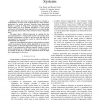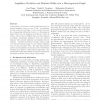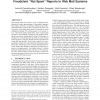152 search results - page 4 / 31 » An Information-Theoretic Model of Voting Systems |
IEEEARES
2009
IEEE
14 years 2 months ago
2009
IEEE
—There have been several attempts to develop a comprehensive account of the requirements for voting systems, particularly for public elections. Typically, these approaches identi...
SDM
2012
SIAM
11 years 10 months ago
2012
SIAM
In this article, we propose a random walk-based model to predict legislators’ votes on a set of bills. In particular, we first convert roll call data, i.e. the recorded votes a...
PST
2004
13 years 9 months ago
2004
Abstract-- The United Kingdom (UK) government has repeatedly expressed a desire to employ a Remote Electronic Voting (REV) system in a general election after 2006. Most existing RE...
ARESEC
2011
12 years 7 months ago
2011
—Transparency is crucial to ensuring fair, honest elections. Transparency is achieved by making information (e.g. election result) public. In e-voting literature, this publicatio...
CEAS
2011
Springer
12 years 7 months ago
2011
Springer
Web mail providers rely on users to “vote” to quickly and collaboratively identify spam messages. Unfortunately, spammers have begun to use bots to control large collections o...



